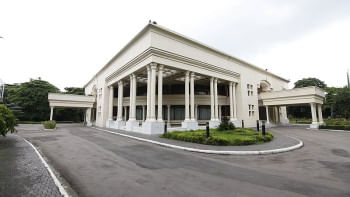Dev not possible without empowering women
State Minister for Finance and Planning MA Mannan yesterday committed to investing more for gender equality, after attending a four-day global conference Women Deliver in Denmark.
“If you can give us projects that have welfare aspects (for women and girls), we will surely allocate budget for that…I can say this from my ministry's viewpoint,” he said at a views-exchange meeting at Bella Centre in Copenhagen.
Some 30 representatives from Bangladesh's government and non-government organisations attended the programme on what messages they can carry home after attending the conference that concluded yesterday.
The conference in more than a 100 sessions and plenaries focused on health and education of women and girls, who are at the centre stage of Sustainable Development Goals 2030, which says none should be left behind.
State minister MA Mannan, Dr Habibe Millat MP, Health Secretary Syed Monjurul Islam, health ministry and NGO officials, and young leaders from Bangladesh attended the conference, where more than 5,000 representatives from around the globe participated.
Mannan said Bangladesh's domestic resources are increasing, but often there are allocation problems, and no logical projects are submitted.
He also suggested that the people, civil society members, NGOs and media should ask the government how it is spending its resources. “Watch our work…Inquire how and where we are spending public money. This is more important,” he said.
Bangladesh, in various sessions, was appreciated for its progress in different areas of women empowerment, including reduction of maternal and child mortality rates, and equal enrolment of girls in primary schools.
But the child marriage level was still higher, which is 52 percent, and a major factor behind high-rate of maternal mortality, 170 per one lakh live births.
Dr Millat said the Bangladesh Association of Parliamentarians on Population and Development in a recent meeting has taken a resolution to keep the marriage age of girls at 18. “There should be no exception,” he said.
Recently, the draft act on marriage age stirred debate as it has a provision allowing girls to get married at 16 with the parents' permission and court's approval.
Sathya Doraiswamy, chief of health at the UNFPA in Bangladesh, said equality, quality and accountability are the three basic components that need to be ensured in all programmes.
“The most important thing is to reach the society's most marginalised segment,” he said, noting that the government, NGO and media need to work in close collaboration to achieve gender equality.
Kaosar Afsana, director of Brac Health, Nutrition and Population programme, suggested ensuring completion of girls' secondary education since a good share of them drop out. “If that is done, we can successfully achieve the SDGs.”
Syed Monjurul Islam observed it was crucial to make higher investments for the adolescents who are the future leaders.
In a plenary session yesterday, Kofi Annan, former secretary general of the UN, called upon the men to work for women empowerment.
“Men have to move from being not patriarchal to anti-patriarchal,” he said.
Neven Mimica, European commissioner for International Cooperation and Development in the Juncker Commission, suggested having gender dimension in the government or NGO programmes. “If it is without women, it is not development,” he said.
“We (men) cannot be free unless women are free. Because they are our part,” said Ethiopian Foreign Minister Tedros Adhanom Ghebreyesus, who was presented Women Deliver Award for Perseverance for his contribution to promoting gender equality in Ethiopia.

 For all latest news, follow The Daily Star's Google News channel.
For all latest news, follow The Daily Star's Google News channel. 



Comments